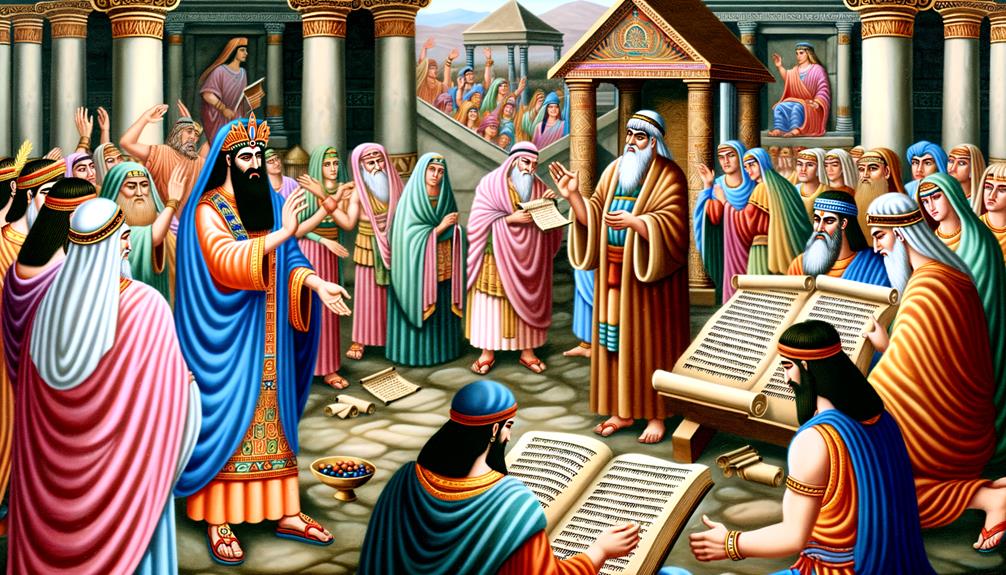Reformation Meaning in the Bible: Renewal and Change
Reformation in the Bible signifies divine initiatives to restore fidelity to God’s covenant through spiritual, moral, and religious renewal. Old scriptures examples like King Josiah’s rediscovery of the Law and eradication of idolatry underscore the importance of aligning communal and personal lives with divine directives.
Prophets such as Isaiah and Jeremiah called for repentance to avert impending judgment. In the New scriptures, Jesus emphasized inner transformation through repentance and love.
The apostles, particularly Paul, addressed theological corrections and moral behavior in early Christian communities. These biblical narratives underscore the enduring need for spiritual reformation, shaping both historical and contemporary faith practices.
To understand more about the theological and practical implications, explore further insights.

Key Takeaways
- Reformation in the Bible involves returning to God’s laws and aligning communal life with divine ordinances.
- Prophets and New Testament figures called for repentance and spiritual renewal, highlighting consistent need for transformation.
- Jesus’ teachings emphasized inner spiritual rebirth and ethical living, essential for true reformation.
- Early Church reforms addressed doctrinal errors, promoting adherence to apostolic teachings and practical piety.
Old Testament Examples

The concept of reformation in the Old Scripture is vividly illustrated through the religious and social reforms enacted by leaders such as King Josiah and the prophet Ezra.
King Josiah, reigning in the 7th century BCE, spearheaded a thorough religious overhaul, purging Judah of idolatrous practices and reinstating the worship of Yahweh as detailed in 2 Kings 22-23. His discovery of the Book of the Law catalyzed a national covenant renewal.
Similarly, Ezra the scribe, post-exilic leader, reestablished adherence to Mosaic Law, emphasizing the Torah’s primacy upon returning from Babylonian captivity.
These reforms, grounded in scriptural mandates, underscored a return to covenantal fidelity, showcasing the Old Scriptures’ emphasis on aligning communal life with divine ordinances.
Prophetic Calls to Reform

The prophetic calls to reform in the Bible are prominent in both the Old and New Scriptures, emphasizing the need for spiritual and moral renewal.
Old Scripture prophets such as Isaiah and Jeremiah admonished Israel to return to covenantal faithfulness, while New Scripture figures like John the Baptist and Jesus himself urged repentance and transformation.
Through these prophetic voices, Scripture underscores the perennial necessity of aligning communal and individual lives with God’s righteous standards.
Old Testament Prophets
Old Covenant prophets, such as Isaiah, Jeremiah, and Ezekiel, played pivotal roles in calling the people of Israel to spiritual and societal reform, urging them to return to covenantal faithfulness amid periods of moral and political decline.
Isaiah’s prophecies addressed the nation’s injustices and idolatry, emphasizing God’s holiness and the need for repentance (Isaiah 1:16-20).
Jeremiah, often called the ‘weeping prophet,’ confronted Judah’s disobedience, warning of impending exile while also promising future restoration (Jeremiah 7:3-7; 29:11).
Ezekiel, exiled in Babylon, delivered messages of judgment and hope, illustrating Israel’s spiritual renewal through vivid visions (Ezekiel 37:1-14).
These prophets served as divine messengers, calling Israel to align their lives with God’s righteous standards.
New Testament Teachings
While Old Covenant prophets laid the groundwork for spiritual reformation, New Scripture teachings advance these calls to reform through the ministry and messages of Jesus Christ and the apostles.
Jesus’ teachings emphasized repentance, love, and the Kingdom of God, urging a transformation of heart and mind (Matthew 4:17). His parables and Sermon on the Mount provided ethical and spiritual guidance, reflecting a call to inner change.
The apostles, particularly Paul, extended this message, emphasizing sanctification and renewal through the Holy Spirit (Romans 12:2). The Book of Acts recounts the early Church’s adherence to these teachings, showcasing a community reformed by divine principles.
Consequently, the New Covenant encapsulates a prophetic call for continual spiritual and moral reformation.
Reformation Under King Josiah

The reformation under King Josiah represents a pivotal moment in Israel’s history, marked by the rediscovery of the Book of the Law during temple renovations, as recorded in 2 Kings 22.
This monumental event precipitated a covenant renewal ceremony, emphasizing a collective return to Yahweh’s commandments.
Additionally, Josiah’s vigorous campaign to eradicate idolatry underscores his commitment to purifying the nation’s worship practices, aligning them with the divine statutes.
Rediscovery of the Law
King Josiah’s reformation marked a pivotal moment in biblical history, characterized by the dramatic rediscovery of the Book of the Law in the temple. This event, chronicled in 2 Kings 22:8-13, catalyzed profound religious and social reforms.
The high priest Hilkiah found the sacred text during temple repairs, initiating an era of theological reawakening. Josiah’s reaction—tearing his clothes in sorrow—underscored the nation’s deviation from covenantal obligations.
Scriptural analysis reveals that this rediscovery realigned Judah with Mosaic Law, emphasizing monotheism and ethical conduct. Historically, it reinstated the centrality of the Torah, reinforcing the notion that divine instructions were integral to societal governance and spiritual fidelity.
This pivotal moment underscored the transformative power of scripture in guiding national renewal.
Covenant Renewal Ceremony
In a profound act of spiritual and national rededication, Josiah orchestrated a covenant renewal ceremony that reaffirmed Judah’s commitment to the Mosaic Covenant, as detailed in 2 Kings 23:1-3. This significant event underscored a collective return to Yahweh’s statutes and commandments, aiming to restore religious purity and societal order.
The ceremony encompassed several notable elements:
- Public Reading of the Law: Josiah read aloud the rediscovered Book of the Law, emphasizing divine expectations.
- Solemn Oath: The king and his people pledged to follow the Lord wholeheartedly.
- Unified Participation: The ceremony involved all inhabitants of Jerusalem, symbolizing national unity and collective responsibility.
This covenant renewal was essential in realigning Judah with its foundational theological principles.
Idol Removal Campaign
Following the covenant renewal ceremony, Josiah initiated an extensive campaign to eradicate idolatry from the land, demonstrating a resolute commitment to purging Judah of all symbols and practices contrary to Yahwistic worship.
This reformation is meticulously documented in 2 Kings 23, where Josiah orders the destruction of altars, Asherah poles, and high places dedicated to foreign gods. His actions align with Deuteronomic mandates, emphasizing exclusive devotion to Yahweh.
Josiah’s measures extended to the desecration of sites such as Topheth, where child sacrifices occurred.
This thorough purge underscores the theological principle of monotheism central to Israel’s covenantal identity, showcasing a leader’s profound influence in steering a nation back to its foundational beliefs and practices.
New Testament Transformation

The New Covenant chronicles a profound transformation in spiritual understanding, marked by the life, teachings, and resurrection of Jesus Christ. This transformation is evident through:
- The Fulfillment of Prophecy: Jesus’ life and mission fulfilled numerous Old Scripture prophecies, establishing Him as the promised Messiah (Matthew 5:17).
- The Establishment of Grace: Unlike the Mosaic Law, which emphasized works, the New Scripture heralds salvation by grace through faith (Ephesians 2:8-9).
- The Indwelling of the Holy Spirit: Believers are transformed and empowered by the Holy Spirit, a promise realized at Pentecost (Acts 2:1-4).
These elements underscore the shift from the old covenant of the law to the new covenant of grace, fundamentally altering the believer’s relationship with God.
Jesus’ Teachings on Renewal

Central to Jesus’ ministry, His teachings on renewal encapsulate a transformative vision for individuals and communities, rooted in repentance and a new way of living aligned with God’s kingdom (Mark 1:15).
Jesus emphasized the necessity of an inner spiritual rebirth, as exemplified in His dialogue with Nicodemus: ‘You must be born again‘ (John 3:7). This renewal transcends mere ritualistic observance, calling for a profound change in heart and mind.
The Sermon on the Mount (Matthew 5-7) further illustrates this renewal, urging adherents to embody humility, mercy, and righteousness.
Jesus’ parables often depicted the kingdom of God as a dynamic, renewing force, challenging the status quo and inviting believers to participate in a divine, restorative mission.
Apostolic Letters and Reformation

Paul’s epistles provide profound insights into the theological and practical reforms necessary for the early Christian communities.
Through letters such as Romans and Corinthians, Paul emphasizes the transformation of believers’ lives and the establishment of new ecclesiastical norms.
These writings offer a critical lens for understanding the shifts in doctrine and practice that shaped the nascent Church.
Paul’s Teachings on Change
In his epistles, Paul emphasizes the transformative power of faith, urging believers to embrace a renewed life in Christ. His teachings on change are foundational to understanding the process of spiritual reformation.
Paul’s letters consistently highlight three key aspects:
- Renewal of the Mind: Romans 12:2 underscores the need for mental transformation, aligning one’s thoughts with divine will.
- New Creation in Christ: 2 Corinthians 5:17 discusses the believer’s new identity, shedding old ways to embody the spirit of Christ.
- Fruit of the Spirit: Galatians 5:22-23 lists the virtues that should manifest in a reformed life, evidence of inner change through the Holy Spirit.
Paul’s scriptural insights offer a profound historical and theological framework for understanding personal and communal reformation.
Early Church Reforms
The Apostolic Letters, foundational to the formation of early Christian doctrine, reflect significant reforms aimed at guiding nascent communities towards a cohesive and authentic expression of faith.
These epistles, authored primarily by Paul, Peter, James, and John, addressed doctrinal errors, ethical dilemmas, and communal disputes. For instance, Paul’s letters to the Corinthians and Galatians emphasize unity and correct theological misconceptions.
Similarly, the Epistle of James underscores practical piety and social justice, urging believers to demonstrate faith through actions.
These documents not only provided immediate pastoral guidance but also established enduring principles.
Scripturally, they underscore the transformative power of Christ’s teachings, shaping a reformed identity that sought to align closely with the apostolic witness and divine revelation.
Personal Spiritual Revival

A personal spiritual revival often begins with an individual’s earnest quest for a deeper and more authentic relationship with God, invigorated by a renewed understanding of biblical teachings.
This transformative journey can be traced through various elements of faith drawn from historical and scriptural foundations.
- Scriptural Study: Delving into the Bible with an analytical mind, seeking to comprehend the depths of God’s word and its application.
- Prayer and Reflection: Engaging in intentional prayer and meditation, fostering a personal dialogue with God.
- Community and Fellowship: Participating actively within a faith community, drawing strength and insight from collective worship and shared experiences.
These steps are essential in cultivating a personal revival that resonates with the timeless truths of scripture and the historical context of faith.
Reformation in Early Church

Early Church reformation was marked by significant theological shifts and ecclesiastical developments that aimed to restore the purity and authenticity of Christian worship and doctrine. This period saw challenges to doctrinal corruption and efforts to return to the teachings of Jesus and the Apostles. Key figures like Paul and Augustine addressed issues such as heresy, ecclesial authority, and liturgical practices.
| Aspect | Description |
|---|---|
| Theological Shifts | Addressed heresies such as Gnosticism and Arianism to refine Christian belief |
| Ecclesiastical Changes | Reformation of church hierarchy and governance to reflect early practices |
| Liturgical Practices | Adaptation of worship styles to align with Apostolic traditions |
These efforts were foundational in shaping the theological and structural integrity of the Early Church.
Theological Implications

Understanding the theological implications of early church reformation requires a deep examination of scriptural interpretations and doctrinal shifts that defined the era. This period marked a transformative re-evaluation of biblical texts, leading to significant theological realignments.
Key implications include:
- Sola Scriptura: Emphasizing the Bible as the sole source of divine authority, challenging the established ecclesiastical hierarchy.
- Justification by Faith: Shifting the focus from sacramental rituals to faith in Christ alone as the basis for salvation, altering the landscape of Christian soteriology.
- Priesthood of All Believers: Rejecting the exclusive mediating role of clergy, promoting a more personal and direct relationship between individuals and God.
These shifts redefined Christian practice and understanding, aligning more closely with perceived biblical teachings.
Contemporary Relevance

The theological principles that emerged from the early church reformation continue to hold significant influence in contemporary Christian thought and practice, shaping modern interpretations of scripture and ecclesiastical structures.
Central to this enduring relevance is the emphasis on *sola scriptura* (scripture alone), which underscores the Bible as the ultimate authority in guiding faith and conduct. This principle encourages individual engagement with scripture, fostering a personal relationship with God.
Additionally, the reformation’s stress on *sola fide* (faith alone) persists in contemporary doctrine, affirming that salvation is through faith, not works.
These theological tenets have prompted ongoing dialogues on church governance, worship practices, and doctrinal purity, ensuring that reformation principles remain integral to the lived experience of faith today.
Conclusion
The concept of reformation in the Bible encompasses a rich tapestry of historical, prophetic, and theological dimensions.
Particularly, King Josiah’s reforms led to a rediscovery of the Torah, igniting significant religious renewal.
Jesus’ teachings further emphasized inner transformation, which catalyzed the early Church’s evolution.
A striking statistic: approximately 40% of the Old Scripture comprises prophetic literature, underscoring the persistent divine call for reformation.
Such scriptural insights continue to hold profound contemporary relevance for spiritual revival.






